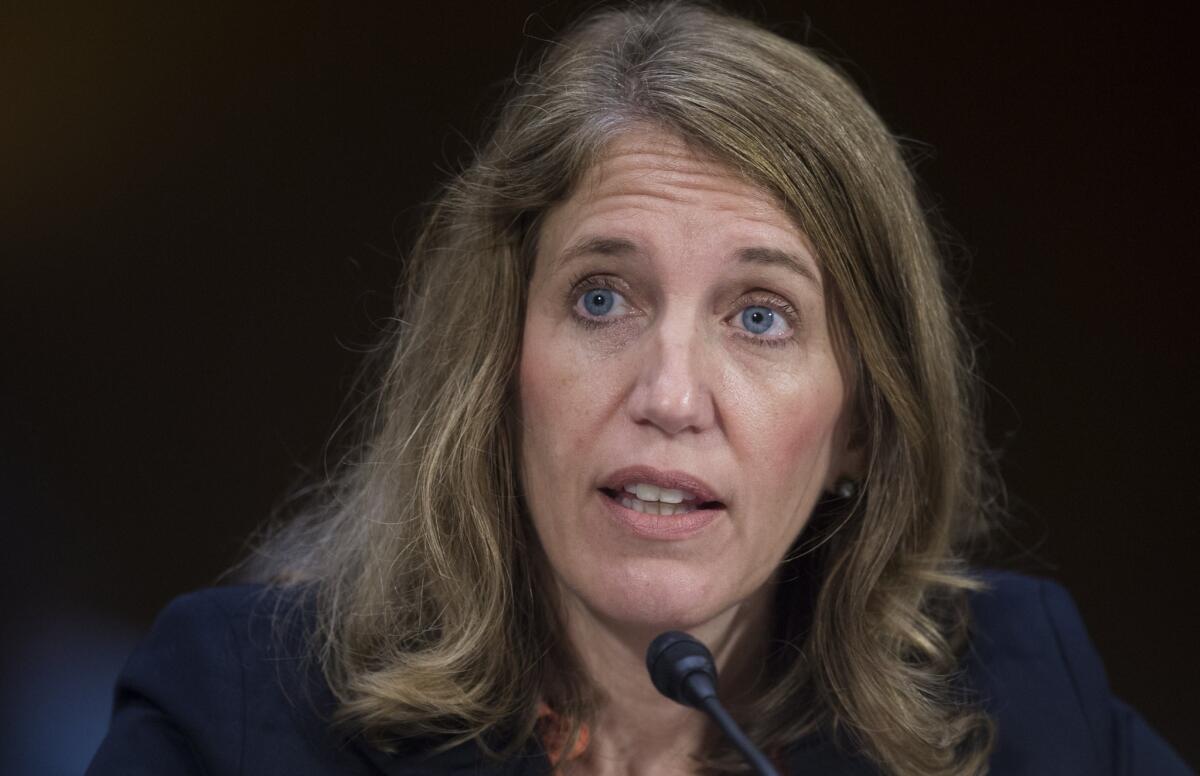Opinion: Trying to save the contraception mandate by changing its address

- Share via
Here’s a prediction: The next legal battle over the Obama adminsitration’s contraception mandate will be over who has to write what kind of letter to whom.
The administration announced Friday the latest tweaks to the requirement that all new employer-sponsored health plans include coverage for female contraception with no out-of-pocket costs. The changes, which respond to a pair of Supreme Court rulings, are designed to keep the coverage in place for female employees while allowing more religious-affiliated nonprofits and some privately held for-profits to distance themselves further from the transaction.
At least, that’s the theory. In fact, it’s hard to see how the new system is all that different from the old one. But, by the same token, some critics seem to object mainly to the fact that female employees can obtain contraceptive services at no out-of-pocket cost from the same insurers who provide their employer-sponsored policies.
Under the previous approach, a religious-affiliated nonprofit (such as a Catholic hospital) could get an exemption from the contraception mandate by sending a specific form to the government and its insurer or insurance administrator. The insurer would then, on its own dime, offer the coverage to the nonprofit’s female employees with no out-of-pocket costs.
In the new setup, such a nonprofit could claim an exemption by informing the Department of Health and Human Services in writing -- but not using any particular federal form -- that it had a sincerely held religious objection to the mandate. The notice would have to identify which contraceptive services the nonprofit objected to, as well as providing contact information for its insurer or insurance administrator. HHS and the Department of Labor would then inform said insurer or administrator that it had to provide the coverage, even though the nonprofit employer would have no financial or administrative involvement.
In short, a nonprofit will now exempt itself by sending a letter to the government, which will effectively shift the cost of providing and administering the contraceptive coverage to the insurer or third-party administrator. That’s almost exactly the way it used to work. The main difference is that the insurer will be notified of the change by the government, not by an employer sending it a copy of a federal form.
Not surprisingly, some opponents of the mandate aren’t happy about the new version. New Republic quoted one, Arina Grossu of the anti-abortion Family Research Council, who called the change “simply another clerical layer to an already existing accounting gimmick that does nothing to protect religious freedom because the employer still remains the legal gateway by which these drugs and services will be provided to their employees.”
If employers are providing a gateway, though, it’s simply the connection they make between their workers and their insurers. Insurers, not employers, are obliged under HHS regulations to provide coverage for contraceptive services. And under both the old and the new arrangements, the contraceptive portion of the coverage is supposed to be funded and administered separately from the employer’s plan.
By Grossu’s logic, the only way employers could not act as a gateway is if female employees obtained contraceptive coverage first from the market for individual policies, then signed up for their nonprofit employer’s plan. That’s problematic because only four states require insurers to provide separate contraception plans, according to the Guttmacher Institute, which does research on reproductive rights.
It’s also worth noting that the administration cribbed its proposal directly from the order the Supreme Court issued in July when it granted an Illinois Christian college an injunction that exempted it from having to comply with the contraceptive mandate. The court held that if a religious affiliated nonprofit notified the government in writing of its objection, it would be exempt. But the government could then tell insurers to provide the coverage, the court’s majority stated.
Wheaton College was one of a number of religious affiliated nonprofits that have challenged the mandate in court, arguing that it violates their religious principles (mainly because they regard some of the covered contraceptives as abortifacients, although supporters of the mandate don’t agree with that characterization). The mandate has also come under attack from for-profit private businesses, whose owners say it violates their beliefs too.
The Supreme Court recently sided with two such employers, Hobby Lobby and Conestoga Wood Specialties, holding that the mandate violated the statutory protections for religious freedom. In response, the administration proposed a rule Friday that would exempt closely held (that is, not publicly traded) for-profit employers with religious objections to the mandate from having to “contract, arrange, pay or refer for contraceptive coverage.” It sought comment, though, on how to define which employers would qualify and how to make sure their female employees would still have access to contraceptive coverage with no out-of-pocket cost.
One obvious approach would be to apply the same procedures to these employers as the administration just applied to nonprofit religious affiliates. That makes just as much sense, but would probably go over just as poorly.
Follow Healey’s intermittent Twitter feed: @jcahealey
More to Read
A cure for the common opinion
Get thought-provoking perspectives with our weekly newsletter.
You may occasionally receive promotional content from the Los Angeles Times.










